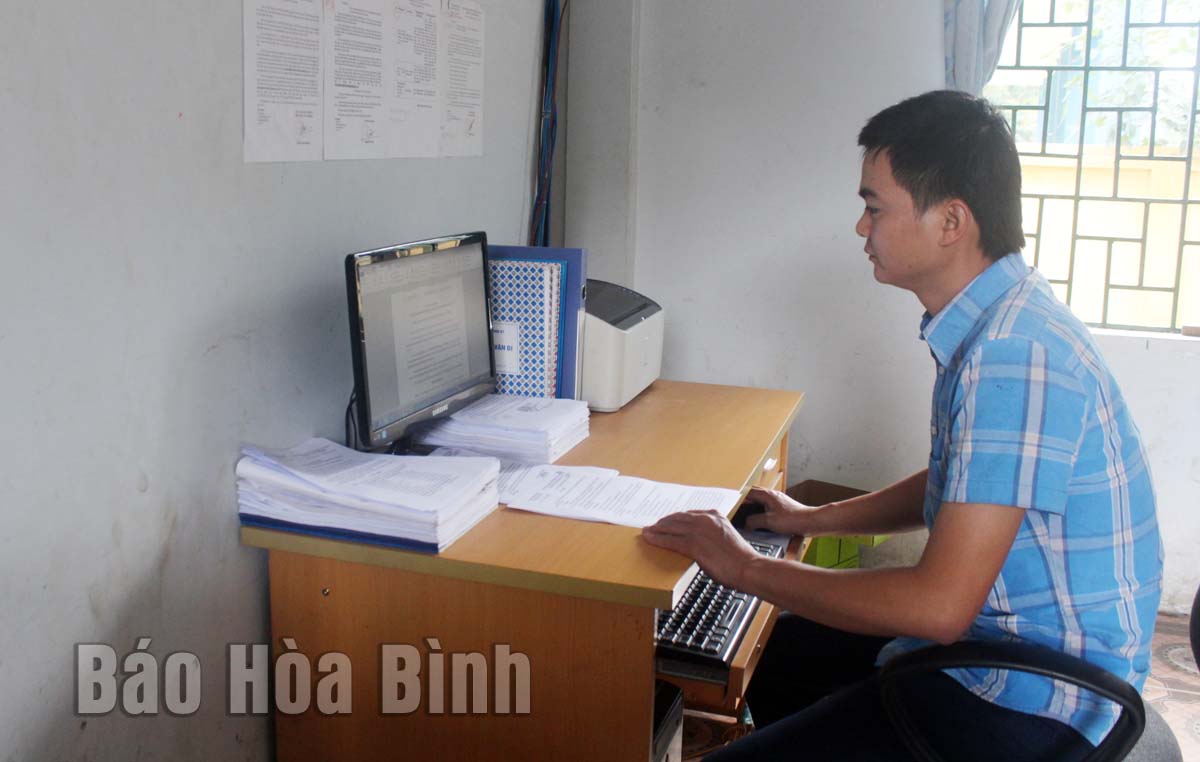
(HBO) – The northern mountainous province of Hoa Binh has determined digital transformation as an indispensable requirement for sustainable development, and issued a series of resolutions and decisions on digital transformation for the 2022-2025 period with vision to 2030.

Officials
in Tan Lac district apply information technology to improve work efficiency
In 2022, the provincial People's Committee and the provincial
Digital Transformation Steering Committee issued documents directing the
implementation of digital economy and digital society in the province.
Accordingly, the document management and administration system
has been deployed to all state administrative agencies at all three levels of
province, district and commune. State agencies processed electronic documents
online through document management and administration system with digital
signature.
The province's online video conferencing system operates
efficiently, ensuring communication, sound quality, clear images, and
organising meetings in a timely fashion to help save time and costs.
Over the past time, along with the shift of e-government,
digital economy has also been promoted and deployed in all economic fields with
a highlight of agricultural and rural digital economy which has developed
sustainably on the e-commerce platforms such as Portmart.vn and Voso.vn.
The development of digital economy has gradually changed the
perception and traditional ways of doing business of people and households
about selling products on the digital space, e-commerce platforms, expanding
product consumption to foreign markets.
In
order to effectively implement the province’s digital transformation plan in
2023, the provincial People’s Committee has proposed five key solutions, namely
promoting communication and raising awareness and digital skills; enhancing
interaction with people and businesses;researching and cooperating to
master and effectively apply technologies; attracting information technology
resources; and strengthening international cooperation.
Hoa Binh province is undergoing a dynamic transformation amid Vietnam’s national digital transition. Building on Poliburo’s Resolution No. 57-NQ/TW on breakthroughs in science, technology, innovation, and national digital transformation, the province has rolled out a wide range of practical action plans. A standout initiative is the "Digital Literacy for All” movement, an effort to ensure that no one is left behind in the digital era.
Hoa Binh province is undergoing a dynamic transformation in the wake of the national digital transformation movement. Building on Resolution No. 57-NQ/TW of the Politburo on breakthroughs in science, technology, innovation, and national digital transformation, the province has implemented a wide range of practical action plans. A standout initiative is the "Digital Literacy for All” movement ambitious effort to ensure that no one is left behind in the digital age.
With a spirit of unity and proactive problem-solving, the Party Committee, the government and the people of Dong Lai Commune (Tan Lac District) have made great strides in implementing the resolutions of the 24th Party Congress of the commune for the 2020 - 2025 term. Focusing on leadership and practical actions, the commune has brought the Party’s resolutions into daily life, creating strong impacts and pushing the local development forward.
Amid the nationwide push for digital transformation, young people in Hoa Binh Province are stepping up as dynamic pioneers, applying technology to enhance Youth Union operations and expand the reach of youth-led initiatives. Through creativity and adaptability, Youth Union organizations at all levels have introduced a series of practical solutions, contributing to modern governance and community development.
In recent years, An Nghia commune, located in Lac Son district, has stepped up administrative reform, focusing on improving the quality and efficiency of its single-window service unit for receiving and processing administrative procedures. These improvements have helped create favourable conditions for local residents and organisations to handle administrative procedures, contributing to the commune’s broader socio-economic development.
The Prime Minister-approved master plan to develop the multi-use value of forests ecosystems through 2030, with a vision to 2050, aims to improve the management and sustainable use of forest resources, create jobs, increase incomes, and improve the living standards of ethnic minorities, people in mountainous and remote areas, forest workers and those living near forests.



